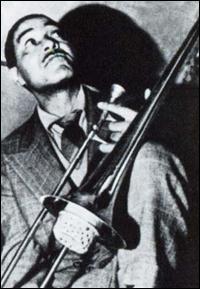Dicky Wells, also known as Dickie, was a leading black American jazz trombonist. He was born June 10, 1907/09 in Centerville, Tenn. (U.S.) and died Nov. 12, 1985, New York. His melodic creativity, expressive techniques, and musical talent are well-known, particularly during the big band era. Wells started playing trombone as a child in Louisville, Ky. He moved to New York City at the age of 20 and joined the Lloyd Scott band. After being a member of several New York bands (including those led by Charlie Johnson, Benny Carter and Fletcher Henderson), Wells was noted for his playing. He then worked with Teddy Hill in the mid-1930s, where he also played in Europe. With some interruptions, his longest tenure was with Count Basie (1938-50). He was a freelance trombonist for most of his life, and worked frequently with former Basie sidemen Buddy Tate or Earle Warren. Wells had a rich, full trombone tone and a distinct vibrato. His phrasing was influenced by the unique trombone construction. His lines featured simple, but expansive phrasing that was enhanced by grace notes or portamenti. His solos were often structured around rhythmic contrasts and melodic improvisers. His most memorable solos include “Sweet Sue, Just You”, and “Arabesque,” with Spike Hughes; “Dickie’s Dream,” and “Taxi War Dance” together with Basie; as well as the 1937 small-group recordings in Paris, which included Django Reinhardt, Hangin’ Round Boudon, and “Sweet Sue”. After the 1940s, Wells’s original art lost its grandeur and was replaced by broad humor. However, he kept much of his melodic wit and swing. Stanley Dance (1971) wrote The Night People, his reminiscences. from http://www.britannica.com
